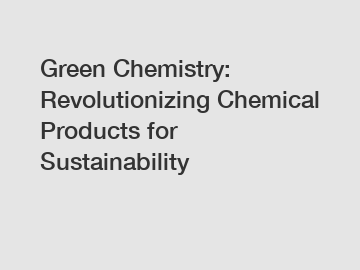Green Chemistry: Revolutionizing Chemical Products for Sustainability
Green Chemistry: Revolutionizing Chemical Products for Sustainability.
Chemical products are an integral part of our daily lives. From cleaning products to pharmaceuticals, these products play a crucial role in maintaining our health and well-being. However, the production and use of chemical products often contribute to pollution and environmental damage. To address these issues, the concept of green chemistry has emerged, revolutionizing chemical products to promote sustainability and protect the environment.
What is Green Chemistry?

Green chemistry, also known as sustainable chemistry, is the design and production of chemical products that minimize or eliminate the use and generation of hazardous substances. It aims to reduce the environmental impact of chemical processes, while still meeting their intended purpose. By incorporating principles such as waste prevention, renewable resources, and energy efficiency, green chemistry provides a sustainable approach to the development and use of chemical products.
Reducing Hazardous Substances:
One of the major goals of green chemistry is to reduce the use and generation of hazardous substances. Traditional chemical processes often involve the use of toxic materials that can harm human health and the environment. Green chemistry promotes the development of alternative substances that are less toxic or non-toxic, ensuring a safer production process and minimizing the environmental impact.
Renewable Resources:
Another aspect of green chemistry is the use of renewable resources in the production of chemical products. Traditional processes often rely on non-renewable resources, such as fossil fuels, which contribute to climate change and depletion of natural resources. Green chemistry encourages the use of renewable resources, such as agricultural crops or biomass, as a sustainable alternative. This not only reduces carbon emissions but also promotes the efficient use of natural resources.
Energy Efficiency:
Green chemistry also emphasizes the importance of energy efficiency in chemical processes. By optimizing process design and incorporating energy-efficient technologies, it is possible to reduce energy consumption and minimize greenhouse gas emissions. This not only leads to cost savings but also contributes to a more sustainable chemical industry.
Case Study: Green Solvents.
One significant development in green chemistry is the production of green solvents. Traditional solvents often pose environmental and health risks due to their toxic nature and high volatility. Green solvents, on the other hand, are derived from renewable resources and have low toxicity, making them a safer and more sustainable option. These solvents can be used in various industries, such as pharmaceuticals, paints, and cleaning products, without compromising performance.
Conclusion:
Green chemistry is revolutionizing the chemical industry by promoting the production and use of sustainable chemical products. By reducing hazardous substances, utilizing renewable resources, and optimizing energy efficiency, green chemistry offers a pathway to a more sustainable and environmentally friendly future. As consumers, it is crucial for us to support and demand green chemical products to promote sustainability. To explore green and sustainable chemical options, contact us, your trusted supplier, who are committed to providing environmentally friendly solutions to meet your needs.
Keywords: contact us, supplier.
For more information, please visit Lithium iron Phosphate Cathode Material Precursor, iron phosphate suppliers, Tsaker new energy.


